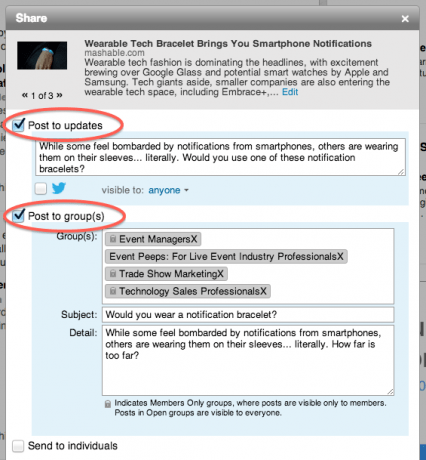Linkedin is no longer just for job seekers.
 Though this professional social network is a great tool for those in the job market, it’s also an undervalued resource for marketing. If you’re not already weaving a Linkedin marketing strategy into your mix, start tomorrow before the playing field grows more crowded.
Though this professional social network is a great tool for those in the job market, it’s also an undervalued resource for marketing. If you’re not already weaving a Linkedin marketing strategy into your mix, start tomorrow before the playing field grows more crowded.
Unlike so many others, you don’t have to start from scratch. Here are seven tested tips for creating a powerful Linkedin marketing strategy today! A base level of activity can yield results and social media ROI in just a couple hours per week. Try it and let us know how it works.
(For a more in-depth training, check out our How to Build Releationships With Linkedin Class.)
7 Steps to a Powerful Linkedin Marketing Strategy
1. Update your status daily
Status updates can be about new developments in your career, links to relevant industry news articles, links to your blog content, or re-shares of your company’s recent news. The key to updating your status on Linkedin is to make your news is valuable to your network. As Stephanie Sammons points out in Social Media Examiner you want to be “consistently visible, valuable and timely.”
Protip: If you want a specific connection of yours to see your update or to comment back, tag their name (using the “@” symbol) so they are notified.
2. Comment on status updates of connections
Many ignore this, but like other networks, Linkedin is more than a broadcast network. A simple “congratulations!” can go a long way when interacting with new leads in a professional setting. Your connections will quickly pick up on that fact that you are paying attention. (If you know our philosophy, you know we’re all about the power of conversations.)
3. Comment on group discussion threads
The first step here is to find groups that are valuable to you. Use Linkedin’s advanced search options to look for groups, then join at least five. Watch discussions for opportunities to weigh in with your professional opinion or expertise. Group discussions can also be a great place to look for motivation for your next blog topic!
Protip: Pay attention to the “Groups You May Like” section to find great group suggestions.

4. Start group discussions for blog topics
Have a blog post you want to share? Link to it from a relevant group discussion. Looking for crowd-sourced feedback for a blog topic? Ask a question in groups and use pull quotes from the discussion it sparks.
Protip: Source code each of your blog links with a unique code using the Google URL Builder to indicate which group you shared the link in. That way, when looking at your analytics, you can quickly tell which group drove the most clicks to determine your most valuable groups.
5. Follow strategic partner company pages
By following these companies, you’ll see their status updates in your newsfeed. Show your support by interacting with their updates (sharing, commenting, liking, etc.).
Maximizing Your Linkedin Company Page
6. Update company status once daily
Similar to your personal status update, this daily update should provide value to your company’s Linkedin followers and employees.
Protip: Share your company’s blog posts first from the company status update. Then, re-share that update from your personal Linkedin account to your status and to groups all at once. This is a BIG time saver!
7. Optimize Your Product/Services section
Like all social media sites, it’s crucial to till out your full company profile to be found in relevant searches, but many still fail to do this. Fill out the products and services section of your company profile, including links to your website. But don’t stop there.
Don’t be shy about asking satisfied customers for recommendations. Those stamps of approval act as online testimonials more powerful than anything you could write. Plus, Linkedin recommendations carry more weight than other networks because there’s a full professional resume behind them.
There you have it, an easy to follow guide to get more from your Linkedin marketing strategy, or just to get started. Do you have more tips? Share them below!

Leave a Reply